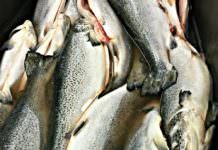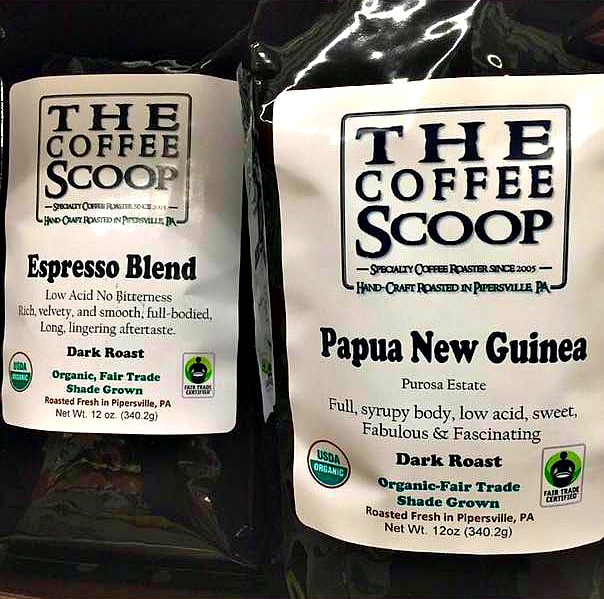
My coffee is roasted on a small Bucks County country road not half an hour from my house. I think that’s pretty cool.
“We’d go out on a Sunday afternoon and couldn’t find a decent cup of coffee,” says Warren May, who with his wife, Karen, runs the small coffee business, The Coffee Scoop, from their Pipersville home.
Both Karen and Warren retired early from corporate jobs, he from 33 years at Merck, she from 23 years with Unisys.
“Now what?” was the question. “We wanted to do something completely different,” explains Karen, “and we like good coffee.” In 2005 they entered the coffee roasting business.
There are a lot of things special about the Coffee Scoop but probably most significant is that they are only one of two 100% organic and fair trade coffee roasters in Pennsylvania. 
All the beans come from completely organic growers from all over the world. Each bag comes with a certificate with a serial number that matches the serial number on the 132 lb. bag of beans. If that sounds like a lot of paperwork, it’s only the beginning for a business that gets audited yearly for their organic status.
The day begins at 3 am for Warren as he walks out to the roasting shed on their property. He’ll spend the next four hours or more roasting beans.

The roasting process seems simple but there are layers of skill and experience that go into it. First, Warren roasts a small 8 ounce batch in a roaster specially designed to sample roast.
With every 3-5 degree increase, he pulls out a sample of the beans and sets them aside for tasting.
When he is done, Karen will grind the beans and start the “cupping” process. After grinding, she pours hot water on the sample, pushes aside the surface layer and both tastes – really, slurps – and smells the coffee beneath, allowing it to coat the tongue.
“Coffee beans have natural sugars,” explains Warren, “the challenge of roasting is to caramelize – not burn – the sugars.”
This is what Karen is looking for in the samples. Where does smooth become rough and bitter? At what temperature should Warren roast the rest of the bag? This profiling is done for each bag of beans from each country of origin. Because a bag from one grower will differ from another grower in the same country.
And what customers have told the Mays they like most about their coffee are the taste and the freshness. That comes from the cupping process and packaging coffee hours after roasting.
After roasting the rest of the bag in small batches at the appropriate temperature, Warren carries the beans into their house for packaging. The old farmhouse has a large dining room that serves as a warehouse with a second small kitchen for weighing and packaging. This is truly a cottage industry! All has been approved by the Board of Health and the USDA organic certification inspectors.
large dining room that serves as a warehouse with a second small kitchen for weighing and packaging. This is truly a cottage industry! All has been approved by the Board of Health and the USDA organic certification inspectors.
Warren then spends the rest of his days delivering coffee to stores, restaurants and markets from the Lehigh Valley to South Jersey, including seven Whole Food Markets, where the Coffee Scoop is one of only a few 100% fair trade organic roasters (for a full list of retail locations see their website).
The business actually began online and sales continue to grow from their website with shipments of coffee all over the country. Now you can find them at area farmers’ markets as well, like Wrightstown.
 What exactly does it mean to be “organic” and “fair trade”? Organic means no chemicals have been used in the growing process and usually that sustainable farming practices have been used instead.
What exactly does it mean to be “organic” and “fair trade”? Organic means no chemicals have been used in the growing process and usually that sustainable farming practices have been used instead.
A fair trade symbol connotes certification by one of the national or international fair trade organizations. These entities work to ensure farmers get a fair price for their goods.
Often they work to help farmers establish co-operatives where they are more likely to get fair pricing and treatment. Many fair trade organizations also help establish schools for both children and adults to teach literacy and agricultural practices, figuring the more one knows the stronger one’s trading position. They may even go so far as to establish medical clinics, teach practices to protect the environment and ensure safe working conditions.
The Coffee Scoop is certified fair trade by Fair Trade USA, a national organization based in Oakland, CA.
From the farmers the beans go to grower co-operatives. Distributors then buy directly from these co-operatives and the Coffee Scoop buys from a variety of distributors. Then, Warren drives to Bayonne, NJ – where the beans enter the country – every week or so to pick up the bags of coffee beans. With this supply chain, the Mays can know the provenance of each bag – from country of origin to the actual farmer.
The Coffee Scoop roasts beans from three parts of the world: Asia, Africa and the Americas. Each has a different taste profile.
I learned that Asian coffee – from Sumatra, Papua New Guinea, Java, and India – tends to have low acidity (good for those of us with stomach issues) and are full-bodied, smooth and earthy.
Coffee beans from Africa are the highest in acidity and come from Ethiopia, Kenya and Rwanda. They tend to be medium- to full-bodied, with “intense floral aroma and enticing fruity or winey flavors.”
Finally the Americas, covering much of Central and South America, produce light to medium bodied coffees with “clean, lively flavors and crisp acidity.”
 “There is as much variation in good coffee as in good wine,” says Warren, and I believe it after hearing the process they go through to ensure sweet, smooth coffee. Now I want to try all the roasts, from everywhere, and train my palate to also taste the differences. Maybe I’ll even cut down on the sugar and creamer, usually added by most coffee drinkers to offset bitterness. Dare I drink my coffee black? For sure I am approaching any coffee shop with a different attitude and awareness.
“There is as much variation in good coffee as in good wine,” says Warren, and I believe it after hearing the process they go through to ensure sweet, smooth coffee. Now I want to try all the roasts, from everywhere, and train my palate to also taste the differences. Maybe I’ll even cut down on the sugar and creamer, usually added by most coffee drinkers to offset bitterness. Dare I drink my coffee black? For sure I am approaching any coffee shop with a different attitude and awareness.
As Warren says, “I want people to enjoy their coffee.” And I agree. Life’s too short to drink bitter coffee.
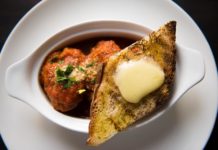
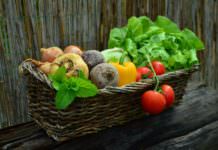

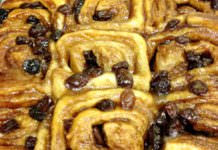
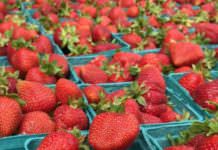
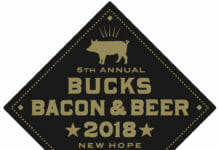
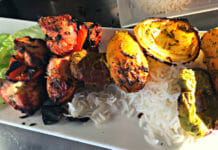
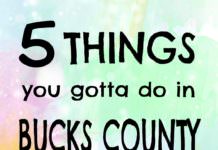
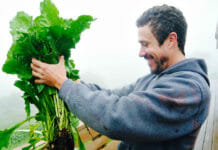
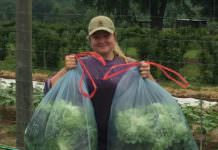
![What we’re reading [Oct 16 2017]](https://www.buckscountytaste.com/wp-content/uploads/2017/10/coffee_macbook_reading_pexels-photo-414630-218x150.jpeg)
